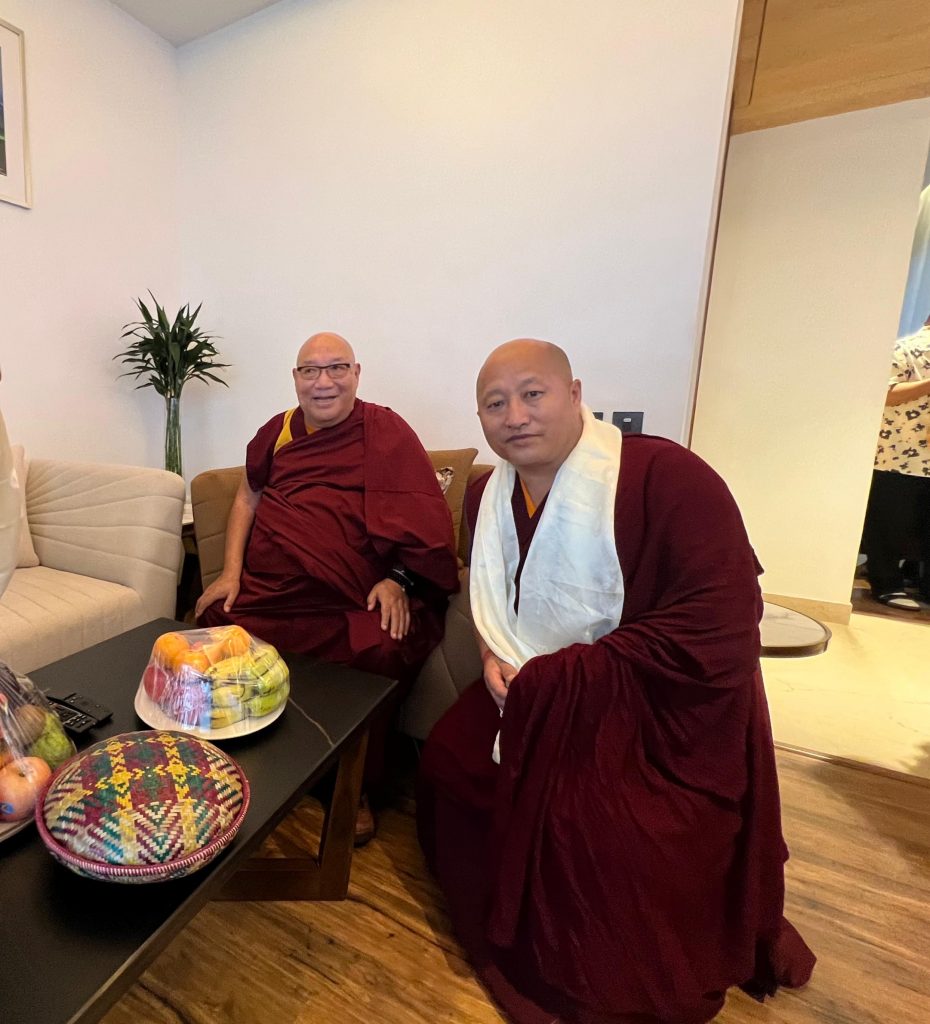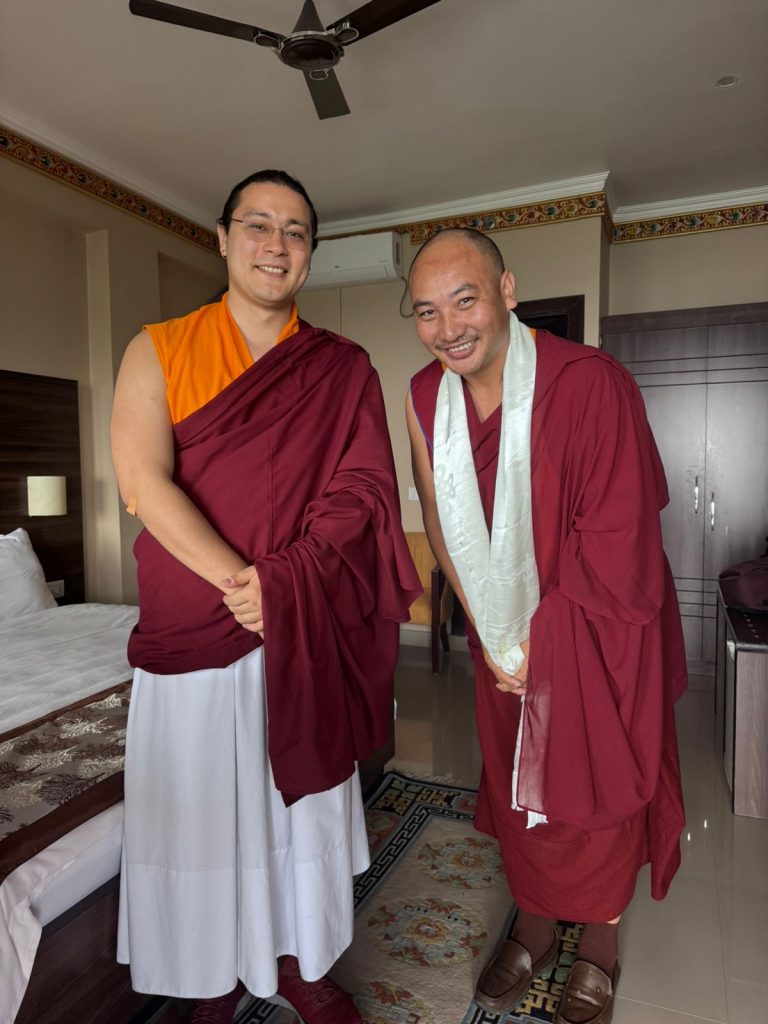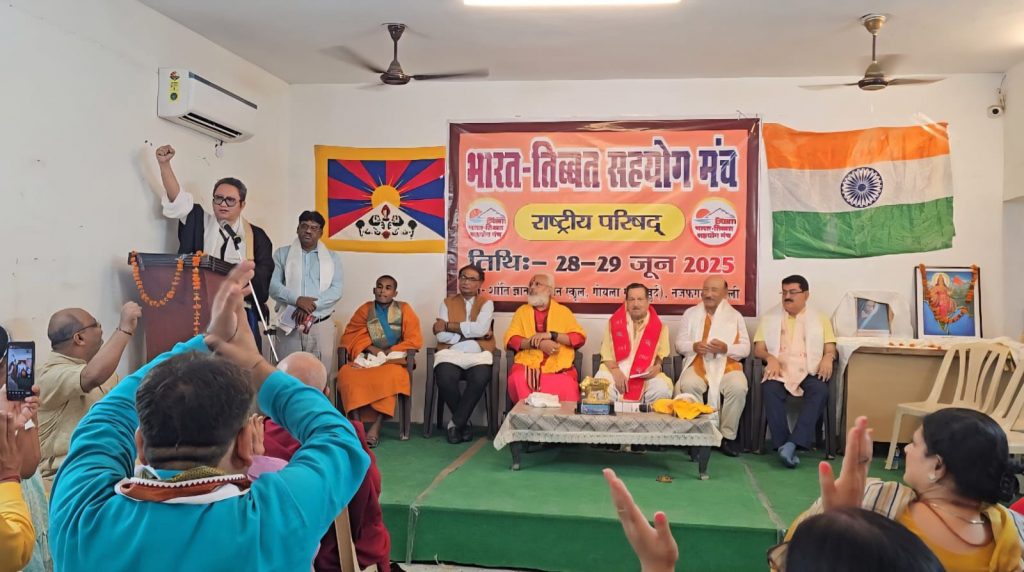We are today commemorating a day of outstandingly high importance, marking the 90th birthday of His Holiness the Great 14th Dalai Lama, the Lord of the Victorious Ones, whose name – to state it in its wholeness to spell out what he fully means – is Jetsun Jamphel Ngawang Lobsang Yeshi Tenzin Gyatso Sisum Wanggyur Tsungpa Meypey-de Pal-Sangpo. His Holiness embodies the crowning glory of the world’s both material and spiritual, including those of the gods in the heavens. He is the designated patron-deity of Tibet, the Avalokiteshvara, who has incarnated in human form; the spiritual lord of the three realms of existence; a champion of world peace; a master of the entire corpus of the teachings of the Buddha on this earth; the guardian-deity of the entire Tibetan people; and an incomparable leader. On this momentous day of utmost importance, the Tibetan Parliament-in-Exile, speaking on behalf of all Tibetans, wishes to extend greetings and good wishes to His Holiness with feelings of joy, devotion, and gratification.
Born on the 6th of July in 1935 in the village of Taktser in Tsongkha area of eastern Tibet in Domey province, and named in his childhood as Lhamo Dhondup, the birth of His Holiness the Dalai Lama was a purposive one, aimed at carrying forward the works of his preceding Dalai Lama incarnate. On the basis of signs and symbolic appearances, as well as prophesies received from visions which appeared on the sacred Lhamo Latso lake in Tibet, he was recognised as the reincarnation of the preceding Dalai Lama. More strikingly, the recognition was reinforced by and confirmed beyond all doubts on the basis of the child’s instant remembrance of facts and events from his preceding life as the Dalai Lama, which led to his being ushered to Lhasa, the capital of Tibet, to be installed on the golden throne in the Potala Palace on the 22nd of February in 1940.
From about the end of the year 1949, communist China began its armed invasion of Tibet. The development plunged the peace-loving people of the country into an immediate danger of the devastating turmoil of war. As a result, on the 17th of November in 1950, the entirety of the beings both in the human and divine realms of Tibet ardently prayed to the then 16-year-old Great 14th Dalai Lama, beseeching that he assume the temporal and spiritual supreme leadership of the country. Given the criticality of the tragically bad situation Tibet found itself in at that time, His Holiness had no choice but to ascend the throne. Then, in 1951, the communist Chinese government asserted nothing but threats of brute outright force to compel representatives of the government of Tibet to sign in Beijing what came to be known as the 17-Point Agreement. In such a situation, His Holiness the Dalai Lama sought to establish amity with the government of China on one hand, while initiating the modernization of the political and social structure of Tibet on the other hand. For this purpose, he set up in 1954 a reform office, while undertaking other reforms as well. Particularly, in 1956, he, for the first time, established a public grievances investigation department. Ultimately, however, because the government of China entirely disregarded, even trampled, on the 17-Point Agreement, and also plotted an existential harm on His Holiness the Dalai Lama. His Holiness was forced to flee into exile to India, with his entourage, in 1959.
Immediately on arriving in India, His Holiness the Dalai Lama engaged with top leaders of the government of India to seek their support and assistance. In general terms, this was directed at protecting the unique religious and cultural identity of Tibet, for which purpose religious abodes, rehabilitation settlements, educational centres and so forth were newly established. In particular, His Holiness ensured the continuance of the Gaden Phodrang government of Tibet and re-established its various offices. And the type of government he envisaged was one long cherished by him in his mind: an untrammelled embrace of a path towards the excellence of the democratic system. And so, in 1960, he established for the first time a Tibetan parliament with its members directly elected by the public. With the accumulation of experiences over the course of living in exile, His Holiness took a series of decisions in the following decades that included enlarging the different offices of the government’s administrative bodies. He established a law-making parliament that exercised supervision and control over these offices while also passing laws and rules and regulations. And for ensuring proper administration of these laws, His Holiness established a judicial body. These institutions exist in the form of central bodies with networks of subordinates offices at various local levels. To put it all in a nutshell, His Holiness the Dalai Lama established for the first time in Tibetan history a full-fledged democratic system of government complete with all the three pillars of a democratic setup and the requisite autonomous bodies that are integral to it. Likewise, His Holiness also established for the first time in exile fully equipped centres for the learning, practice, and promotion of the various cultural traditions of Tibet that constitute parts of what are popularly referred to as the five major fields of knowledge and the five minor ones of Tibet. Today, people of other nationalities across the world have also developed interest in them and actively taken to study and practice them.
In these ways, His Holiness the Dalai Lama has taken numerous initiatives in exile that are nothing short of historic in their importance and relevance. And by also taking steps to internationally publicize the issue of Tibet, he has helped to ensure the adoption of historic resolutions on Tibet at various national and international forums that included the United Nations Organization. He reached out to establish friendship with people of other religious faiths across the world, initiated the popularization of education in secular ethics, took Buddhist teachings as basis for holding dialogue with experts in modern science, established a conference of top religious leaders of Tibet representing all schools or faith systems, institutionalised the system for the conferment of the Geshema degree, and took the final step for fully democratising the Tibetan government system by ensuring that its top leaders are appointed by election through popular franchise. The Gaden Phodrang government that exercised authority over the entirety of the Tibetan territory was established in the year 1642 by His Holiness the Great Fifth Dalai Lama. It was able to continue its existence in exile even after the revolutionary change that transformed the entire situation in Tibet. Even so, His Holiness the Great 14th Dalai Lama, by taking cognizance of the totality of the entire situation – including changes in times and the realities of international trends, as well as the ultimate, long-term interests of the Tibetan people – decided in the year 2011, to devolve his political authority to leaders directly elected by the Tibetan people. His Holiness thereby brought to an end the nearly four hundred year-long Gaden Phodrang rule over Tibet. These and numerous other steps represent important examples of His Holiness the Dalai Lama’s globally significant accomplishments.
The fact that His Holiness the Great 14th Dalai Lama embodies the totality of the noble accomplishments of all the past Dalai Lamas, and continues to be in that role in body, speech, and mind to this day, can never be erased from the memory of the Tibetan people. It is owing to the greatness of his accomplishments in these fields that His Holiness is widely admired across the world, which honoured him with hundreds of awards and other forms of recognitions that included the Nobel Peace Prize. These have helped to win attention, respect,
and support to the struggle of the Tibetan people from the international community. Indeed, there is no denying the fact that His Holiness has played a singularly critical role towards the realisation of this situation. Accordingly, the Tibetan Parliament-in-Exile wishes to take the opportunity provided by this occasion to offer to him its gratitude of utmost appreciation. And in order to express this feeling of gratitude and for his continued efforts in this direction, without being daunted by the hardship of it all, the Central Tibetan Administration and the people of Tibet are observing this year as the “Year of Compassion”. And it has become important for everyone to make efforts during this year to put into practice the edifying advices of His Holiness the Dalai Lama and to engage in religiously meritorious activities so that the political and religious works for the cause of Tibet may meet with success, and the great wishes and desires of His Holiness may be accomplished.
Recently, from June 3 to 4 in 2025, the Tibetan Parliament-in-Exile organized the 9th World Parliamentarians’ Convention on Tibet in Tokyo, the capital of Japan. Lawmakers from a total of 29 countries took part in it either by physical presence or by online means and it was a great success. The event concluded with the adoption of a Tokyo Declaration, a Tokyo Action Plan, and a Resolution Honouring the 90th Birthday of His Holiness the 14th Dalai Lama. The unanimously adopted six-point special resolution ahead of the global commemoration of his 90th Birthday recognised His Holiness the Dalai Lama for “his lifelong commitment and contribution to the promotion of oneness of humanity, nonviolence, human rights, religious tolerance, environmental awareness, and democracy, thus making a new chapter applauding his accomplishments and calling for the continuance of his admirable work in these fields.
His Holiness the Dalai Lama has affirmed the continuation of the institution of the Dalai Lama during the 15th Tibetan Religious Conference, held recently from July 2 to 4, any politically driven interference from China will never be accepted, as per the resolution adopted at the Conference.
Over the last more than 66 years that we have remained in exile, the government and people of India and, likewise, the United States of America, Europe, Japan, and others from across the international community have provide humanitarian assistance, extended help in the protection of Tibetan religious and cultural identity, and support in every kind of other fields. To all of them, the Tibetan Parliament-in-Exile takes the opportunity of this occasion to express our heartfelt gratitude while urging them to further strengthen their support for us until the day the just cause of Tibet prevails.
In conclusion, the Tibetan Parliament-in-Exile wishes to offer prayers infinite times that His Holiness the Dalai Lama may live for a hundred aeons; that by means of the flourishing of his accomplishments in promoting peace and compassion across the world; and, in particular, by continuing to remain the patron deity of the entirety of the Tibetan subjects out of a feeling of great care and compassion for them, the sunshine of the day of happiness when the Tibetan people living in Tibet and those scattered in exile reunite be realized in all speediness, so that he may be able to set foot on the Snowland of Tibet once again.
The Tibetan Parliament-in-Exile
6 July 2025
. . . . . . . . . . . . . . . . . . . . . . . . . . . . . . . . . . . . . . . . . . . . . . . . . . . . . . . . . . . . . . . . . . . . . . . . . . . . . . . . . . . . . .
* In case of any discrepancy between this English translation and its Tibetan original, the latter should be considered as authoritative and final for all purposes.




